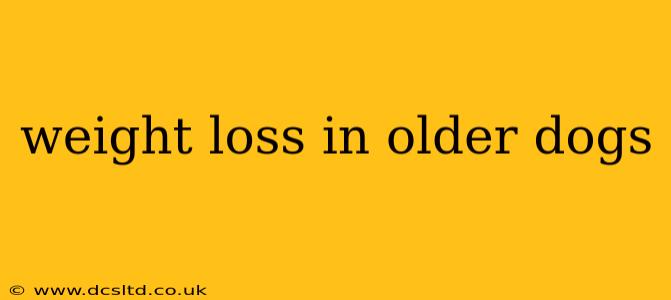Weight management is crucial for dogs of all ages, but it takes on added significance as our canine companions enter their senior years. Older dogs often face unique challenges related to weight loss and maintenance, requiring a more nuanced approach than simply cutting back on food. This comprehensive guide explores the intricacies of weight loss in older dogs, addressing common concerns and offering practical advice to help your furry friend achieve and maintain a healthy weight.
Why is Weight Loss Important for Senior Dogs?
Maintaining a healthy weight in older dogs is vital for several reasons: it significantly impacts their overall health, mobility, and longevity. Excess weight puts extra strain on joints, already potentially weakened by age-related arthritis, leading to increased pain and mobility issues. Obesity can also exacerbate or contribute to numerous health problems, including diabetes, heart disease, and certain cancers. Conversely, significant weight loss can also signal underlying health problems, so it’s important to consult your veterinarian.
What Causes Weight Loss in Older Dogs?
Weight loss in senior dogs isn't always simply a matter of overeating. It can be a symptom of various underlying health conditions. Understanding the potential causes is crucial for effective treatment.
Age-Related Changes:
- Decreased Metabolism: As dogs age, their metabolism slows down, meaning they burn fewer calories at rest. This makes it easier to gain weight and harder to lose it.
- Reduced Activity Levels: Older dogs naturally become less active, further contributing to a slower metabolism and weight gain.
Health Issues:
- Dental Problems: Tooth loss or painful gums can make it difficult for dogs to eat properly, leading to weight loss.
- Cancer: Many types of cancer can cause significant weight loss.
- Hyperthyroidism: An overactive thyroid gland can increase metabolism, leading to weight loss despite increased appetite.
- Diabetes: Uncontrolled diabetes can lead to significant weight loss due to impaired glucose metabolism.
- Kidney Disease: Kidney disease can affect appetite and nutrient absorption, causing weight loss.
- Inflammatory Bowel Disease (IBD): IBD can lead to poor nutrient absorption and weight loss.
- Pancreatitis: Inflammation of the pancreas can affect digestion and nutrient absorption, causing weight loss.
- Parasites: Internal parasites can rob the body of nutrients, resulting in weight loss.
How to Help Your Older Dog Lose Weight Safely and Effectively
Weight loss in older dogs should always be approached cautiously and under veterinary guidance. A sudden or drastic reduction in food intake can be harmful.
Veterinary Consultation:
Before implementing any weight loss plan, schedule a comprehensive checkup with your veterinarian. They can perform a thorough physical examination, run blood tests, and determine the underlying cause of any weight issues. They will also help you determine a safe and effective weight loss plan tailored to your dog's specific needs and health status.
Dietary Adjustments:
- Calorie Restriction: Your vet will recommend a calorie-appropriate diet based on your dog’s breed, age, activity level, and current weight. Avoid sudden drastic changes.
- High-Quality Food: Choose a senior-specific dog food formulated for older dogs’ specific nutritional needs. These foods often have lower calorie density and higher levels of essential nutrients.
- Smaller, More Frequent Meals: This can aid digestion and prevent overeating.
- Increased Fiber: Fiber can help dogs feel fuller for longer.
Exercise:
- Gentle Exercise: Encourage gentle exercise, such as short walks or playtime, to burn calories and maintain muscle mass. Avoid strenuous activity that could strain joints.
- Hydrotherapy: Swimming or underwater treadmill exercises can be beneficial for older dogs with joint problems.
Monitoring Progress:
Regularly monitor your dog's weight and body condition score (BCS). Your vet can show you how to assess your dog's BCS, which helps you track their progress. Adjust the diet and exercise plan as needed based on your dog's response.
What if My Older Dog is Losing Weight Unintentionally?
Unintentional weight loss in an older dog is a serious concern and requires immediate veterinary attention. It’s crucial to rule out underlying health issues that may be contributing to the weight loss.
How can I tell if my older dog is overweight?
Your veterinarian can assess your dog's body condition score (BCS) – a system that rates body fat on a scale. Additionally, you should be able to feel your dog's ribs easily without excess fat covering them. A visual assessment should show a clearly defined waistline when looking at your dog from above.
What are some common mistakes people make when trying to help their older dog lose weight?
Common mistakes include:
- Sudden and drastic diet changes: This can lead to nutritional deficiencies and other health problems.
- Ignoring underlying medical conditions: Weight loss can be a symptom of a serious illness.
- Overexercising: This can put extra strain on already weakened joints.
- Not monitoring progress: It's important to track your dog's weight and adjust the plan accordingly.
By following these guidelines and working closely with your veterinarian, you can help your senior dog achieve and maintain a healthy weight, ensuring a happier, healthier, and longer life. Remember, patience and consistency are key to success.
